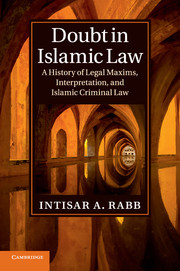
- Cited by 11
-
Cited byCrossref Citations
This Book has been cited by the following publications. This list is generated based on data provided by Crossref.
Abou El Fadl, Khaled 2017. Qurʾanic Ethics and Islamic Law. Journal of Islamic Ethics, Vol. 1, Issue. 1-2, p. 7.
2017. The First of the Modern Ottomans. p. 320.
2017. The Mystics of al-Andalus. p. 354.
Müller, Dominik M. 2018. BUREAUCRATIC ISLAM COMPARED: CLASSIFICATORY POWER AND STATE-IFIED RELIGIOUS MEANING-MAKING IN BRUNEI AND SINGAPORE. Journal of Law and Religion, Vol. 33, Issue. 2, p. 212.
Adamson, Peter and Di Giovanni, Matteo 2018. Interpreting Averroes.
Dua, Jatin 2019. Hijacked: Piracy and Economies of Protection in the Western Indian Ocean. Comparative Studies in Society and History, Vol. 61, Issue. 3, p. 479.
2019. Islamic Law of the Sea. p. 284.
Kamali, Elizabeth Papp 2019. Felony and the Guilty Mind in Medieval England.
2021. Opposing the Imam. p. 236.
2021. The Sufi Saint of Jam. p. 271.
2022. Agents of the Hidden Imam. p. 248.
- Publisher:
- Cambridge University Press
- Online publication date:
- January 2015
- Print publication year:
- 2014
- Online ISBN:
- 9781139953054
- Subjects:
- Middle East Studies, Islam, Area Studies, History, Religion, Middle East History


